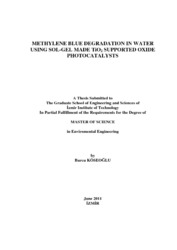Please use this identifier to cite or link to this item:
https://hdl.handle.net/11147/3090Full metadata record
| DC Field | Value | Language |
|---|---|---|
| dc.contributor.advisor | Şeker, Erol | - |
| dc.contributor.author | Köseoğlu, Burcu | - |
| dc.date.accessioned | 2014-07-22T13:50:51Z | - |
| dc.date.available | 2014-07-22T13:50:51Z | - |
| dc.date.issued | 2011 | - |
| dc.identifier.uri | http://hdl.handle.net/11147/3090 | - |
| dc.description | Thesis (Master)--Izmir Institute of Technology, Environmental Engineering, Izmir, 2011 | en_US |
| dc.description | Includes bibliographical references (leaves: 52-55) | en_US |
| dc.description | Text in English; Abstract: Turkish and English | en_US |
| dc.description | x, 67 leaves | en_US |
| dc.description.abstract | Pure TiO2 and Fe3+ doped TiO2 photocatalysts were synthesized by changing H2O/Ti ratio, HCl/Ti ratios and calcination temperatures. Photocatalytic activities of the samples were determined for the degradation of methylene blue. The primary objective of this study is to narrow the band gap energies of the photocatalysts by changing preparation procedure and also doping with Fe3+ ions. Pure TiO2 and Fe3+ doped TiO2 photocatalysts were prepared by the sol-gel method, and also the impregnation method was applied for Fe3+ doping. The characterization of the samples was performed by using XRD and DRS techniques. Photocatalytic activities were measured by using UVvis absorbance. This study shows that the heat treatment directly affected the crystallite size.Generally, crystallite size of the samples increased with calcination temperature and the heat treatment between 700 C and 800 C also resulted in crystalline phase transformation from anatase to rutile. TiO2 samples prepared with H2O/Ti ratio of 4 and HCl/Ti ratio of 0.15 calcined at 700 C and H2O/Ti ratio of 4 and HCl/Ti ratio of 0.45 calcined at 800 C had only rutile phase. Band gap energy is one of the important factors affecting the photocatalytic activities. In this thesis study, band gap energies of the TiO2 samples were calculated using DR spectrums together with Kubelka Munk function. The DRS analyses showed that samples with rutile phase had the smallest band gap energies; in fact, the pure TiO2 samples (H2O/Ti ratio of 4 and HCl/Ti ratio of 0.45 calcined at 900 C) had the minimum band gap energy of 3.019 eV and the maximum photocatalytic conversion of 25% in 10 min and 93% conversion was reached in 15 h. In contrast, photocatalytic conversion decreased with doping with Fe3+ with excessive dissolution of iron ions. | en_US |
| dc.language.iso | en | en_US |
| dc.publisher | Izmir Institute of Technology | en_US |
| dc.rights | info:eu-repo/semantics/openAccess | en_US |
| dc.subject.lcsh | Water--Purification--Photocatalysis | en |
| dc.subject.lcsh | Methylene blue | en |
| dc.title | Methylene Blue Degradation in Water Using Sol-Gel Made Tio2 Supported Oxide Photocatalysts | en_US |
| dc.type | Master Thesis | en_US |
| dc.institutionauthor | Köseoğlu, Burcu | - |
| dc.department | Thesis (Master)--İzmir Institute of Technology, Environmental Engineering | en_US |
| dc.relation.publicationcategory | Tez | en_US |
| dc.identifier.wosquality | N/A | - |
| dc.identifier.scopusquality | N/A | - |
| item.openairecristype | http://purl.org/coar/resource_type/c_18cf | - |
| item.languageiso639-1 | en | - |
| item.openairetype | Master Thesis | - |
| item.grantfulltext | open | - |
| item.fulltext | With Fulltext | - |
| item.cerifentitytype | Publications | - |
| Appears in Collections: | Master Degree / Yüksek Lisans Tezleri Sürdürülebilir Yeşil Kampüs Koleksiyonu / Sustainable Green Campus Collection | |
Files in This Item:
| File | Description | Size | Format | |
|---|---|---|---|---|
| T000903.pdf | MasterThesis | 2.11 MB | Adobe PDF |  View/Open |
CORE Recommender
Page view(s)
194
checked on Mar 31, 2025
Download(s)
140
checked on Mar 31, 2025
Google ScholarTM
Check
Items in GCRIS Repository are protected by copyright, with all rights reserved, unless otherwise indicated.